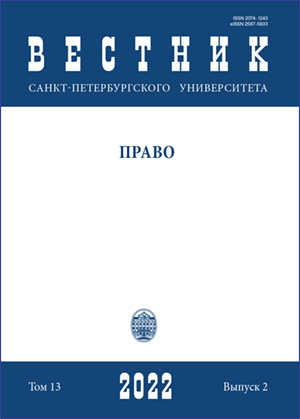Responsibility for corruption in the field of procurement for state or municipal needs: Novelties of criminal legislation
DOI:
https://doi.org/10.21638/spbu14.2022.209Abstract
The article presents a doctrinal interpretation of norms of criminal law that establish responsibility for abuses in the procurement of goods, works, and services for state or municipal needs (Art. 2004 of the Criminal Code of the Russian Federation) and bribery of a contract service employee, contract manager, or member of the procurement commission (Art. 2005 of the Criminal Code of the Russian Federation). The purpose of the study was to help a law enforcement officer in understanding the criminal-legal characteristics of the elements and signs of the above-mentioned elements of corruption crimes, in their difference from related acts, such as abuse of official position, misappropriation of budgetary funds, embezzlement using official position, receiving and giving bribes. Special attention was paid to the distinctive features of the subjects of crimes in the field of procurement of goods, works, services for state or municipal needs. The principles of qualification are explained when a crime is committed by a group of persons by prior agreement if there are special subjects in the composition of the crime. Thanks to the use of such a research method as system-structural analysis, objective and subjective signs of the corpus delicti are presented in detail, criminal liability for which is fixed in Art. 2004 and 2005 of the Criminal Code of the Russian Federation. The conclusions point to the need for careful identification of the signs of the objective side, the subject and the subject of crimes, since they are crucial for the application of the qualification rules.
Keywords:
corruption crimes, contract system, employees of contract services, contract managers, procurement, bribery, abuse, qualification, corpus delicti
Downloads
References
Downloads
Published
How to Cite
Issue
Section
License
Articles of "Vestnik of Saint Petersburg University. Law" are open access distributed under the terms of the License Agreement with Saint Petersburg State University, which permits to the authors unrestricted distribution and self-archiving free of charge.






